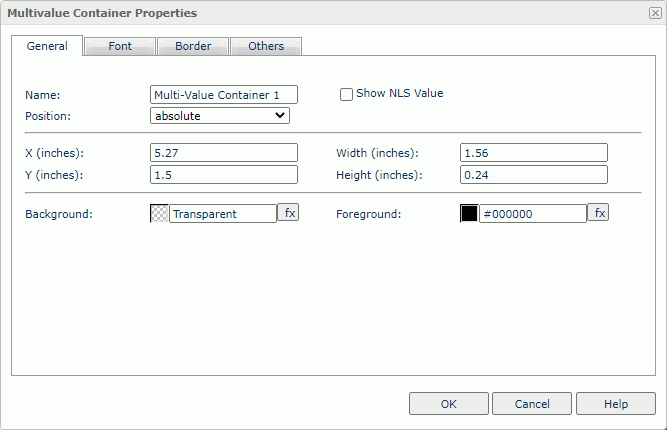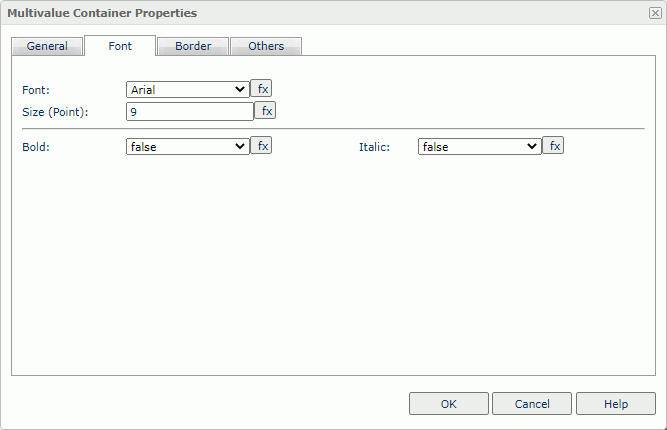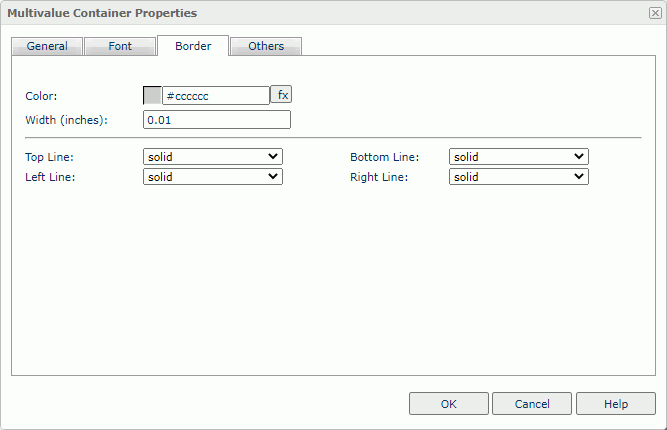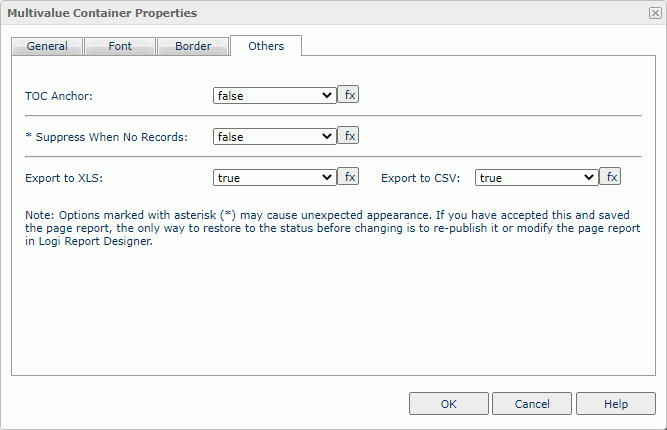Multivalue Container Properties
You can use the Multivalue Container Properties dialog box to edit the properties of a List or Drop-down List, which is a web control. This topic describes the properties in the dialog box.
This topic contains the following sections:
You see these elements on all the tabs:
OK
Select to apply any changes you made here and close the dialog box.
Cancel
Select to close the dialog box without saving any changes.
Help
Select to view information about the dialog box.
General Tab Properties
Specify the general properties of the multivalue container.

Name
Specify the display name of the multivalue container, which shows on its shortcut menu.
Show NLS Value
Select to show the translated name for the display name of the object in the Name text box if you have enabled the NLS feature and translated it, and when you have not modified the display name of the object.
Position
Select the position mode of the component when it is directly contained in the report body, a tabular cell, or a text box.
- absolute
Server locates the component at the position that you specify by dragging and dropping or by setting its X and Y coordinate property values. The component insertion point does not change, for instance, it is not affected when you insert text before it. The position of an object in a banded object can only be absolute. - static
Server positions the component at the location where you insert it. The X and Y coordinate properties are disabled. You cannot move the component to another position other than by moving its insertion point. This can happen when the text flow preceding the insertion point expands. - relative
Server positions the component at an offset to the position at which you insert it. The offset is determined by the X and Y coordinate property values. This value is not available for some types of components. Server displays relative in the default value list for the Position option, when the current position is relative. However, relative is no longer available in the value list after you apply static or absolute and reenter the dialog box.
Server displays relative in the default value list for the Position option, when the current position is relative. However, relative is no longer available in the value list after you apply static or absolute and reenter the dialog box.
X
Specify the X coordinate of the multivalue container.
Y
Specify the Y coordinate of the multivalue container.
Width
Specify the width of the multivalue container.
Height
Specify the height of the multivalue container.
Background
Specify the background color of the multivalue container.
To change the color, select the color indicator to access the Select Color dialog box, and then specify a new color. You can also type a hexadecimal RGB value to specify a color, for example, #9933ff. If you want to make the background transparent, type Transparent in the text box.
Foreground
Specify the foreground color of the multivalue container.
To change the color, select the color indicator to access the Select Color dialog box, and then specify a new color. You can also type a hexadecimal RGB value to specify a color, for example, #9933ff.
Font Tab Properties
Specify the font properties of the multivalue container.

Font
Select the font face of the text.
Size
Specify the font size of the text.
Bold
Select true to make the text bold.
Italic
Select true to make the text italic.
Border Tab Properties
Specify the border properties of the multivalue container.

Color
Specify the border color.
Width
Specify the border width in inches.
Top Line
Select the style of the top border line.
Bottom Line
Select the style of the bottom border line.
Left Line
Select the style of the left border line.
Right Line
Select the style of the right border line.
Others Tab Properties
Use this tab to view and configure some miscellaneous settings.

TOC Anchor
Select true if you want to add the object to the TOC tree in the TOC Browser.
Suppress When No Records
Select true if you want to hide the object in the report when no record returns to its parent data component.
Export to XLS
Select true if you want to export the object when you save the report as an XLS file (make sure to check Data Format in the Export dialog box).
Export to CSV
Select true if you want to export the object when you save the report as a TXT file with Delimited Format.
 Previous Topic
Previous Topic
 Back to top
Back to top